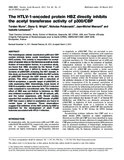The HTLV-1-encoded protein HBZ directly inhibits the acetyl transferase activity of p300/CBP
Author
Wurm, Torsten; Wright, Diana Grace; Polakowski, Nicholas; Mesnard, Jean-Michel; Lemasson, Isabelle
Abstract
The homologous cellular coactivators p300 and CBP contain intrinsic lysine acetyl transferase (termed HAT) activity. This activity is responsible for acetylation of several sites on the histones as well as modification of transcription factors. In a previous study, we found that HBZ, encoded by the Human T-cell Leukemia Virus type 1 (HTLV-1), binds to multiple domains of p300/CBP, including the HAT domain. In this study, we found that HBZ inhibits the HAT activity of p300/CBP through the bZIP domain of the viral protein. This effect correlated with a reduction of H3K18 acetylation, a specific target of p300/CBP, in cells expressing HBZ. Interestingly, lower levels of H3K18 acetylation were detected in HTLV-1 infected cells compared to non-infected cells. The inhibitory effect of HBZ was not limited to histones, as HBZ also inhibited acetylation of the NF-κB subunit, p65, and the tumor suppressor, p53. Recent studies reported that mutations in the HAT domain of p300/CBP that cause a defect in acetylation are found in certain types of leukemia. These observations suggest that inhibition of the HAT activity by HBZ is important for the development of adult T-cell leukemia associated with HTLV-1 infection.
Date
2012-07
Citation:
APA:
Wurm, Torsten, & Wright, Diana Grace, & Polakowski, Nicholas, & Mesnard, Jean-Michel, & Lemasson, Isabelle. (July 2012).
The HTLV-1-encoded protein HBZ directly inhibits the acetyl transferase activity of p300/CBP.
Nucleic Acids Research,
40(13),
5910-
5925. Retrieved from
http://hdl.handle.net/10342/5692
MLA:
Wurm, Torsten, and Wright, Diana Grace, and Polakowski, Nicholas, and Mesnard, Jean-Michel, and Lemasson, Isabelle.
"The HTLV-1-encoded protein HBZ directly inhibits the acetyl transferase activity of p300/CBP". Nucleic Acids Research.
40:13. (5910-5925),
July 2012.
April 25, 2024.
http://hdl.handle.net/10342/5692.
Chicago:
Wurm, Torsten and Wright, Diana Grace and Polakowski, Nicholas and Mesnard, Jean-Michel and Lemasson, Isabelle,
"The HTLV-1-encoded protein HBZ directly inhibits the acetyl transferase activity of p300/CBP," Nucleic Acids Research 40, no.
13 (July 2012),
http://hdl.handle.net/10342/5692 (accessed
April 25, 2024).
AMA:
Wurm, Torsten, Wright, Diana Grace, Polakowski, Nicholas, Mesnard, Jean-Michel, Lemasson, Isabelle.
The HTLV-1-encoded protein HBZ directly inhibits the acetyl transferase activity of p300/CBP. Nucleic Acids Research.
July 2012;
40(13):
5910-5925.
http://hdl.handle.net/10342/5692. Accessed
April 25, 2024.
Collections

